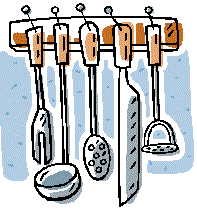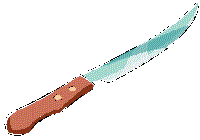
The Care and Feeding of Knives...
Okay, this stuff is important, whatever use you plan to put your knife to!
|
|
The Care and Feeding of Knives...
|
Contents |
I always knew knives were important, and since Iíve spent a lot of time
living with people who love to cook and I mean really love to cook, Iíve learned
a lot about the care and feeding of knives. All my lessons were painful
reminders in my head as my father grappled with trying to carve the turkey last
Thanksgiving with my horribly inadequate supply of knives.
So, to prevent this from happening to other people, I want to give the following
information:
First: Most of us have done this (or at least those of us who have spent at least some time on our own, and really broke); we need a knife right now so we buy a set of the serrated knives from Wal-Mart (or wherever). This is sometimes a necessity, since good knives are expensive, but in the long run a waste of money. If you can, save the money and buy the best knives you can afford. Serrated knives (as opposed to scalloped, or bread knives) are not meant to last, but to be thrown away when they wear out (become dull and useless).
Second: Make sure, no matter what you buy, the knives you purchase can be sharpened. Your knives will last much longer if you can sharpen (or have them sharpened). Stainless steel knives are too hard to sharpen, so beware of them. Serrated knives are obvious, stainless steel is less so. We have a fabric store which has a scissor and knife sharpening service in our town, check around if your fabric store canít help you; they ought to know someone who can.
Third: You really only need two knives to start with: a large chopping knife (called a chefís or butcher) and a small knife (a pearing or peeling). These should cover most jobs, if you need something more, you should already know more than Iím telling you about knives!
Fourth: Okay, youíve gotten two good knives, or youíve had the ones your mother gave you sharpened. Now, do not put them in the washer. Try to wash them off immediately after use; do not soak them in water. Your knives will dull much faster if you do.
Fifth: Do not store the knife blades touching each other, or other metal surfaces. This means you do need something to hold your knives. Personally, I threw out all the crummy serrated knives I had and store my good knives in the wooden holder.
Sixth: Always use a cutting board; cutting on countertops (which will also damage your counters), dishes, etc. will chip the edge of your knife.
Seventh: If you have wooden handled knives, oil them occasionally to keep them in the best shape.
Eighth: There is a lot to be said about the balance of a knife. Iím not so sure about that, my friends who are avid cooks can be very picky about the feel of a knife in their hands. Since I donít cook that often, all I care about is the sharpness (so I can use it), and the care (so it lasts longer and stays sharp). Basically a knife should be well balanced. The handle is typically heaver, so that it balances the length of the knife. Hold the center (not the actual center, the center between the handle and the blade) of the knife in the palm of your hand, it shouldnít tilt either way.
 |
Good luck! I hope your holidays go better than mine! |
|